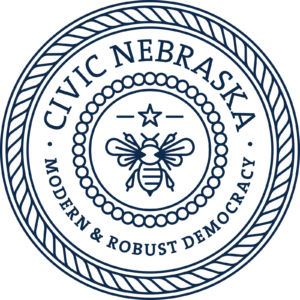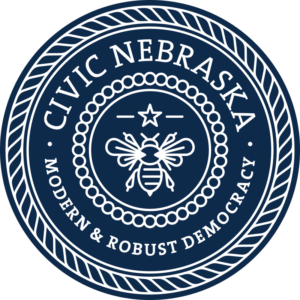Stronger civic engagement often starts with simple awareness.
This winter, two University of Nebraska-Lincoln Honors students increased that awareness in two Nebraska communities by identifying assets and opportunities for strengthening civic life. Ray Nierman worked in his hometown in Harvard, and Alexandria Rinne was in Ashland with the Ashland Area Economic Development Corporation, or AAEDC. The pair were interns this year in Civic Nebraska’s growing Rural Civic Health Initiative.
Both students’ focus was mapping their community’s civic assets: the people, passions, groups, places, events, and resources that sustain civic life. These assets create both the social environment where for friendship and trust, and the civic structures in which residents take collective action and set policies.

In Ashland, AAEDC hoped to identify opportunities to boost engagement by getting the “pulse” of civic engagement in the community through identifying civic assets. The information also helped the organization speed up its effort to become a Leadership Certified Community with the Nebraska Department of Economic Development and helped AAEDC’s new executive director, Caleb Fjone, get oriented to the community.
“It really helped unlock some doors to navigate around communication and where engagement is active,” Fjone said.
Rinne said the framework of focusing on assets made an impression on her from the start.
“The way the Asset Based Community Development reprioritizes community-driven growth, and the connectedness of its members was an entirely new way of thinking that resonated with me,” she said.
After researching content online and in public documents, Rinne made dozens of calls and a trip to Ashland to interview residents and understand their interests and the groups, events, and institutions that form the community’s civic infrastructure. Fjone said the study helped him understand the strong base of civic engagement in Ashland and helped spark a focus on communication that reaches both longtime residents and newcomers.
“The process was really good,” Fjone said. “It wasn’t a study that got a checkmark done and sits on the shelf. It’s being actively used. It’s really important because it’s dealing with citizen participation and engagement, something I deal with every day.”
In Harvard, the civic assets inventory aims to help residents connect over interests and opportunities to be involved in community life. Nierman organized his own advisory group of leaders from across the community and conducted phone and in-person interviews to construct the asset map.
Nierman said one of the most valuable things about the process for Harvard was the connections it created. New opportunities were envisioned from collaboration around new projects and getting students more involved through their Cardinal Power Hours community service program.
“Whether that was through a different organization multiple people were in, similar projects that they were interested in working on or a mutual contact, drawing these connections and helping people to see each other as valuable potential resources was very helpful,” Nierman said.
Nierman and Rinne said they enjoyed their experiences – and grew professionally and personally through them.
“Looking past struggles and improvements to be made and seeing instead the strengths and opportunities available in the community and the people who composed it has changed the way I approach things drastically,” Rinne said. She said she also strengthened her ability to do unguided research, conduct interviews, and find and present connections in a helpful way.
Nierman said: “I learned about the importance of civic engagement on a more real level. Whether it’s through students or through people who are already community members, developing the skills to go about this type of process is something that can help many different communities around Nebraska.”
Civic Nebraska’s Rural Civic Health Initiative works with youth, students, and residents across Nebraska to strengthen social connectedness, confidence in institutions, community engagement, and political involvement. To explore collaborating around strengthening civic health in your community, contact Daniel Bennett, Civic Nebraska’s rural civic health programs manager, at da************@ci***********.org.



